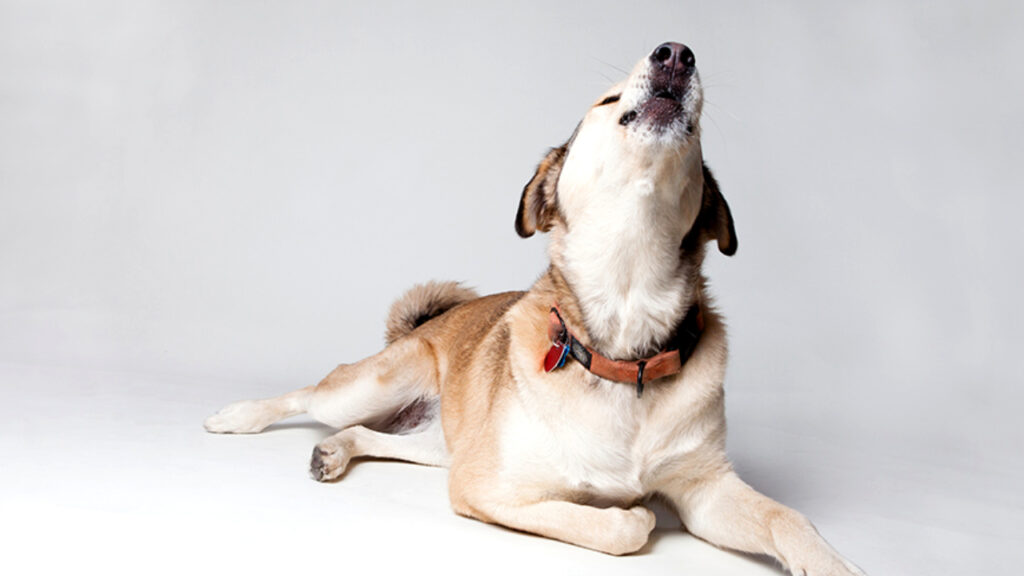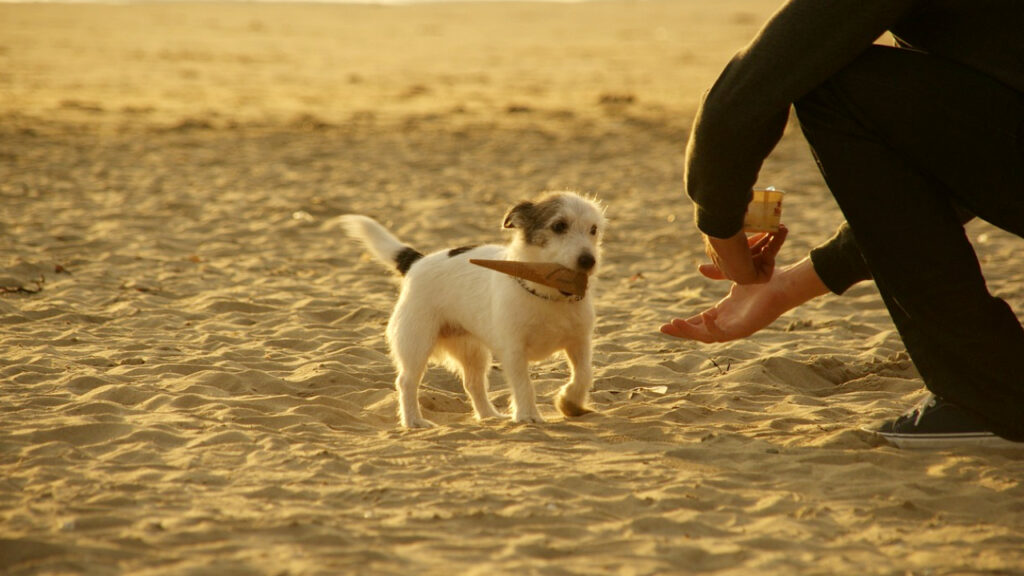
Whether you are a dog owner or not, you certainly have noticed that dogs are howling in the street late at night. And if you have a dog in the house, they might do the same. But why dogs do that?
Why do dogs howl when you howl? Dogs howl when you howl because they respond to your howl, express their bonding, or want your attention. In addition, it could also be a sign of pain, anxiety, or defensive mechanism.
Some dogs may howl to communicate with other dogs, while others respond to high-pitched sounds like an ambulance siren, door opening, squeaking, or musical instruments.
But there can be numerous reasons why your dog howls when you howl. Today we will go in-depth on this topic, figure out the actual reason behind it, and discuss some probable solutions.
Table of Contents
Why Do Dogs Howl When You Howl?
Dogs are descended from gray wolves, and it’s their genetic behavior to howl. Howling is significant for dogs; it indicates many things such as pain, aggression, anxiety, and bonding exercise.
In the wild, when a wolf or dog howls, it usually informs the rest of the family that here I’m, and the family will likely respond by howling; it helps them to stay unite and prevent the family from being lost.
But why do dogs howl when you howl? Let’s find out the possible reasons!
Ancestry Behavior
Dogs are descended from gray wolves, and howling is in their genes; their ancestry behavior got chanced and adapted due to the environment, but still, if you howl at your dog, they will see they will respond by howling back.
In the wild, feral dogs and wolves still howl to communicating with each other; they usually pass the message of impending danger and alert them.
Whether it’s a domestic dog or wild, they will still howl when they hear high-pitched noises like a siren in the night. Similarly, indoor dogs may howl to express their happiness and greet once you get back home after long office hours.
To Express Bonding
Bonding is the prime reason why your dogs howl back at you. Dogs are emotional animals, and once they get bonded with their owner, they will wag their tail, smell your shoes, and howl back to you in responding to your howl.

Whenever you howl at your dog, they feel like you are playing with them, and they howl back to you to initiate the play.
Thus, if you see your dog is howling at you after you have come from a long office day, it’s the sign that they are joyful to see you appreciate it with a small howl or by petting them.
Fear
Dogs often howl to express fear. Dogs, especially puppies, who are in fearful situations may howl. They howl out to inform their family member that they have been surrounded by a stray dog or some other kind of threat.
But, if you have an indoor puppy and they are howling at night, then it could be interpreted as scary, they might be terrified, and it’s not a good indication.
It would help if you took your dog to an expert behaviorist or vet; cheerful, stress-free, and comfortable dogs typically don’t howl.
Your Dog Wants Your Attention
Dogs may also show their need for affection through howling. Dogs are intelligent enough to understand emotional manipulation.
If they howl, they know you will respond to their loud noise by petting, talking, or looking at them, and dogs get your attention.
Your dog may also want your attention for several things. For example, food, if your dog hasn’t fed at the right time, it may howl to divert your attention that they are hungry.
In addition, dogs often want their owner’s attention to initiate a play. Dogs are social animals, and they require a good amount of physical and mental estimation to release their energy and overcome boredom.
Separation Anxiety
Like humans, dogs also suffer from anxiety, especially separation anxiety. Dogs don’t who have toys, or sufficient physical and mental stimulation may get lonely and depressed.
Dogs are incredibly emotional and feel the absence of their favorite bonded person. So, if your dog howls every time you leave for the office and stops howling once you reach home, it is a sign of separation anxiety.
Dogs suffering from anxiety may experience other health issues such as drooling, pacing, and other destructive behaviors.
However, a dog’s anxiety and howling behavior can be treated with proper training and the use of medical aids by a prescribed professional behaviorist or veterinarian.
Responding to Certain Noises
Some dogs may also howl in response to high-pitch noises such as ambulance siren, musical instrumental voice, or police siren.
Dogs are highly alerted animals even when they are sleeping and when they hear high pitch sounds, they acknowledge and express their eagerness by a loud howl and express their desire to join in the action.

As howling is a way of communication for dogs, they assume that the howl comes from another dog and tries to engage in the communication. Thus, if your dog is howling in response to outside auditory stimulation, they will likely stop howling once the ambulance, police, or musical instrument stops.
This type of howl is the most commonly found in feral dogs, and it stops once the ambulance, police siren moves ahead. Usually, they are harmless and don’t require your attention.
Your Dog Might Be Injured
Dogs usually communicate with their body language, touch, and sound. When a dog gets injured, they typically sit at a place and cry, but sometimes they vocalize pain through quite a howl.
These howls shouldn’t be ignored and if your dog is howling to express their pain, take your dog to a veterinarian to figure out the reason for their pain, and if there any, your vet will assist medical treatment.
What Should I Do If My Dogs Are Howling?
There are several reasons why your dog howl when you howl, and most of the time, it’s harmless, and you probably won’t have to do anything.
But sometimes, it gets troublesome for your neighbors, and they might complain about it. In addition, if you howl at midnight, 12 am, or 3 am, it could be problematic.
Here are some simple things you could do to deal with the howling behavior:
Do Nothing, Let Them Howl
Howling and barking is a mode of communication for dogs, and if they are howling and barking due to outside high-pitched noise. In that case, it would be best if you let them howl; the best thing you can do is, ignore your dog completely until he stops howling at you.
Most of the time, howling is harmless, and it stops along with the high-pitched sound, but sometimes it gets annoying, and if this is the case, you can do the followings:
Ensure Your Dog Stays Active
Dogs often howl due to boredom, and if this is the case with you, make sure you include plenty of exercise during the daytime to make them tired.

In addition, you can let your dog play and interact with other dogs. You can take your dog for a walk to the nearest park and let them engage with other dogs and roll out in the garden; it will exhaust your dog and be less likely to have sufficient energy to howl after all this exercise and interaction.
Reward Your Dog For Good Behavior
Rewarding your dog for good behavior is a simple training technique used by many expert trainers, but you don’t have to be an expert in applying this technique.
It’s simple; you can use their favorite food or snack to control their excessive howling behavior. Whenever your dog or puppy howls, don’t encourage it by rewarding them; instead, avoid making eye contact and leave the room for a couple of minutes.
Then go back to the room and if your dog stops howling, reward them with their favorite snack or toy. This will teach your dog good behaviors and may reduce unnecessary howling, barking, and even biting.
Purchase Stimulating Toys
If your dog has an immense bond with you and howls whenever you leave for office, try purchasing stimulating toys. They will keep your dog busy during the daytime while you are away.
There are various toys available in the online market. For example, interactive toys, chew toys, ropes, squeak toys, balls, and other puzzle toys engage your dog both physically and mentally.
Train Your Dog
Positive reinforcement of training is crucial for dogs; it is an ongoing process that takes time. Usually, behavioral training should be started from the very beginning when you first bring the puppy home.
But still, you can use various training techniques and methods to teach your dog not to howl. Just like you train your dog to follow other commands like stop, speak, come here, etc.
Once your dog started to follow the commands, you can praise your dog by giving him their favorite toy, snack, or cookie as a treat. This will reduce their urge to howl and strengthen the relationship between you two.
Why Do Puppies Howl?
Similarly, puppies may also howl to seek attention or food. It also could be a sign of fear, injury, or separation anxiety.
Puppies are more dedicated and require more attention, care, and love than adult dogs. Thus if your puppy is howling, be patient and try to understand their needs and address them accordingly.
If the howling is extreme and troublesome, you can try some behavior-conditioning techniques to reduce the howling behavior or consult with an expert behaviorist or vet for the training program.
Do Some Dogs Howl More Than Others?
You may have noticed that some dogs howl more than others. For example, my neighbor’s dogs used to howl whenever he hears the sound of a siren, while mine doesn’t howl at all.

It all depends on the type of training they had, surrounding, and breed. Some hyper breed dogs like husky, beagle, and bloodhound are more likely to howl than any other dog’s breed. It’s because they all hyperactive and sporty dogs.
However, dogs’ howling is a natural inherit behavior from their ancestors, which means it’s fine for dogs to howl.
Why Do Dogs Howl At 12 am or 3 am?
The exact reason why dogs howl at midnight or 3 am is unknown, but this is what I found during my research.
Dog’s howls at night could mean numerous things. Most likely, your dog has heard some noise or sensed something unusual and howling response to it. Howling at midnight or 3 am could also respond to a vivid dream, or your dog is might expressing their feelings of loneliness and sadness through howling.
Lastly, your dog might also howl to express their pain; it could be a sign of illness, injury, or discomfort.
Therefore, if your dog howls at night, it’s essential to recognize the actual reason for howling, and if it’s because of some internal injury or pain, you should take your dog to a professional vet.
Final Thoughts
By now, you should have understood why dogs howl when you howl. Howling is a natural form of communication behavior, and it’s commonly found in most canine species.
Usually, dogs howl to get your attention or when they hear high-pitch noises of the surrounding. But sometimes, it could be a sign of anxiety, depression, fear, loneliness, disease, or pain.
Thus, if your dog is howling, pay attention to it and find out the actual reason; you can also consult an animal behaviorist or veterinarian.
More Helpful Articles:
